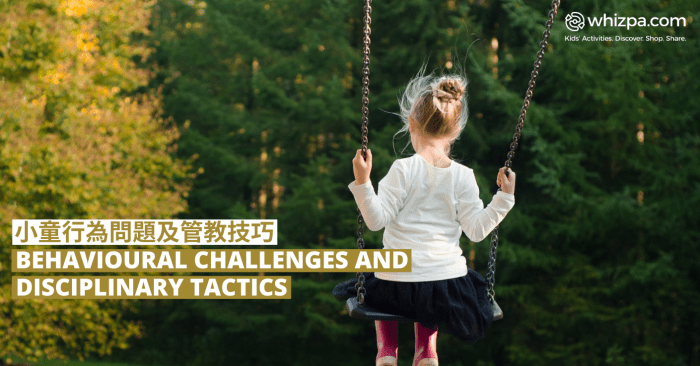
小童行為問題及管教技巧
While school-going-age is often marked with wonderful milestones such as increased independence, higher confidence, and more self-awareness in kids, this age can also be accompanied by some unwelcome challenges.
Primary school kids tend to have much better cognitive and physical motor skills and hence are able to perform everyday tasks with greater ease. They are no longer “babies” or “little kids” but are far from earning the badge of being “big kids”. We often start treating them as mature kids but the truth is that they are yet to develop fully-functional social and emotional skills. For this reason, it is rather common for primary school kids to show defiance, get angry, throw tantrums, or have emotional outbursts.
Contrary to what many adults may believe, kids do not exhibit difficult behaviours to test our patience. More often than not, they genuinely cannot control their reactions, emotions, and behaviours. Factors such as being unwell, excessive screen time, hunger pangs, unexpected change in routine, tiredness, comparisons with peers, among others, may affect their ability to control their reactions.
Let’s look at some of the common challenges faced by parents during this transitional period of development:
• Lying - You might witness your children trying to escape punishment by lying about what they did in a particular situation. They can also lie to brag about something they did in order to elicit a positive response or congratulatory remark from the parents or teachers.
• Being Disobedient - Defiance is another trait that is common in school going kids. For instance, the child may refuse to clean up after playing or ignore your instruction to complete the homework.
• Fighting with Siblings - If you have more than one kid, some form of sibling rivalry or fighting is bound to surface. The child may either have tough time parting with his/her belongings, or sharing the parents’ time and attention.
• Wasting Time - Dawdling can be another undesirable behaviour in this age group. Some children might take hours to just finish a simple writing exercise, or they would take unusually long to finish their meal. This can surely get frustrating for the parents.
• Whining - This is another trait that irks several parents. The kid can find umpteen reasons to not enjoy a particular activity. Family outings can become a chore, for instance, when the child starts to complain it is boring, tiring, too hot, too cold, too long.
• Talking Back to Others- Sometimes, kids may start talking back to the parents in a mean and condescending manner. They might pick up this behaviour by observing their peers at school or playground, or perhaps even from other family members at home.
Fortunately, there are well-researched strategies out there that can be used to address these behavioural challenges and along the way they can also help you teach your child valuable life lessons.
Let’s take a look at these tactics below:
• Carve Out a Personalised List of Rules - Create a list of household rules and hang them in your kids’ bedroom to remind them about following them. Try to list no more than 5-6 key rules and keep them simple. Ensure the wording is positive. Instead of saying, “Don’t snatch things from your brothers/sisters,” say, “Ask for permission before using your siblings’ belongings.” It is also equally important to explain the rationale behind each of those rules. This will help the children understand what’s in it for them and how it makes their life easier and better.
Source: superhealthykids.com
• Fill Up the Attention Basket - Each kid has an attention basket that needs to get filled everyday. Parenting expert, Amy McCready, Founder of Positive Parenting Solutions, suggests taking out dedicated, gadget-free time of at least 10 minutes a day to be fully present with your children. You should be prepared to play any game they suggest, be it kicking around a soccer ball, having a freeze dance party, building a castle, or painting a pretty picture. Spending even this small chunk of quality time together will reduce the power struggles in families, especially around defiance, whining, and backtalks.
• Use Empathy and Connection - As per Nelsen and Gfroerer, co-authors of bestselling Positive Discipline series of books, instead of focusing on reward/punishment strategy, parents should opt for “connection before correction” methodology to instil positive behaviours in children. Reinforce the fact that you and your child are on the same team and you just want to help. Here is an example:
Connection: Validate feelings: “I see you are frustrated and angry.”
Correction: “It is ok to feel what you feel, but it is not okay to push the other kid. What else could you have done? How would you feel if someone did this to you?”
• Praise Positive Behaviours - It might be a good idea to reinforce positive behaviours before they can become negative. For instance, you could tell the child “I think you are doing a great job waiting patiently for your turn at the swing.” Or “I love how you are playing so gently with your brother.” This will go a long way in boosting their confidence and establishing patterns of positive traits in them.
• Set Manageable Goals - If your kid is complaining that the homework is too boring or taking too long, you could consider transforming it into a fun game/challenge. For example, place a small star or a dot on their page for where they should write to in the next 5 minutes (you can also use a sand timer to make time more visual for them).
• Explain Expectations Well in Advance - Kids don’t know how to behave in different situations unless they have been told what is socially appropriate. Kids won’t know they can cheer hard at a football game but need to remain quiet in a theatre. It is advisable to spend a few minutes explaining the rules before you take them into new situations.
• Celebrate Honesty - Even if you’re upset that your kids’ bedroom floor is a watery mess because they decided to give bath to their ruthless dinosaurs in imaginary tubs, appreciate them for coming to you and telling the truth. You could say (in a calm voice), “I know it must have been difficult for you, but I really appreciate you telling the truth and taking on responsibility. Here is how we can clean up the mess.”
• Turn the Consequence into a Reward - You could reduce the power struggles a lot more if you simply turn the consequence into a reward mechanism. Rather than saying, “You can’t have the dessert because you still have not finished your greens,” say, “You can have your dessert as soon as you finish eating the greens off your plate.” This can help the kid learn how to earn privileges by making good choices.
• Focus on Behavior Instead of the Outcome - Praising your kids efforts is much more valuable than simply focusing on the end result. Instead of saying, “Great job getting the first prize on your school quiz,” say, “Good job studying so hard for the quiz.” This rewires their brain to understand that good behaviour is far more important than simply the outcome.
• Indulge in Team Work - When you see certain problematic behaviours are being repeated, sit down with your child and try to find a solution together. Ask questions such as “This is the fourth time your teacher has indicated you leave your books behind in the classroom. What would help you remember to place them back in the bag?” Or, “I see you leave a mess behind after using the bathroom. What can we do to keep it tidy?” Primary school kids can reason well and are more likely follow through if they feel they have had a say in finding the solution.
• Teach How to Express Feelings - Educate your child about expressing feelings and show them it’s safe to do so. You can teach them by being the role model (they watch you all the time) and by encouraging them to express feelings in healthy ways such as drawing, talking, or writing.
Parenting primary school children is certainly a rewarding and challenging job at the same time. Know that this is a transitional phase, things will change, you will see behaviours which are new (some might be pleasant, others not so much). What is important is that we learn our child’s unique way of communicating and teach them ours. We need to be honest about our feelings, set ground rules well in advance, and have an open, trusting environment sprinkled with loads of empathy and patience.
Feel free to use some pointers from the above-mentioned framework and you will soon end up with a unique strategy, that works best for you and your family.
Do let us know in the comments what worked for you!








